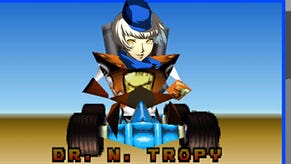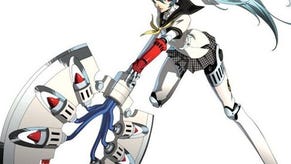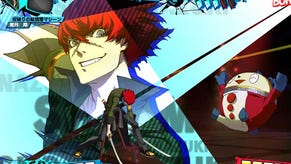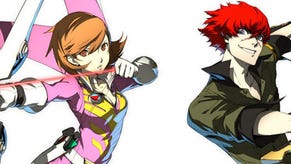Persona 4 Arena Ultimax PS3 Review: Classic Re-Runs on the Midnight Channel
Arc System Works revisits the world of Persona for a encore bout.
This article first appeared on USgamer, a partner publication of VG247. Some content, such as this article, has been migrated to VG247 for posterity after USgamer's closure - but it has not been edited or further vetted by the VG247 team.
So we come to the sequel to a game I never expected to exist. Persona 4 Arena Ultimax is the follow up to Persona 4 Arena, the fighting game based in Atlus' Shin Megami Tensei: Persona universe developed by Guilty Gear dev Arc System Works. That means hot, hand-drawn 2D fighting action with all your favorite characters from Persona 3 and Persona 4, with a few new characters to boot.
Persona 4 Arena Ultimax (Ultra Suplex Hold in Japan) actually picks up right where the first game left off. The first P4A was one of the few fighting games with an equal emphasis on story. It had a plot that actually fit into Persona continuity directly after the events of Persona 4: The Golden, with a full visual novel-style presentation to tell its tale. It felt like Atlus knew what its fans were looking for and tried to provide it even within the confines of a fighting game.
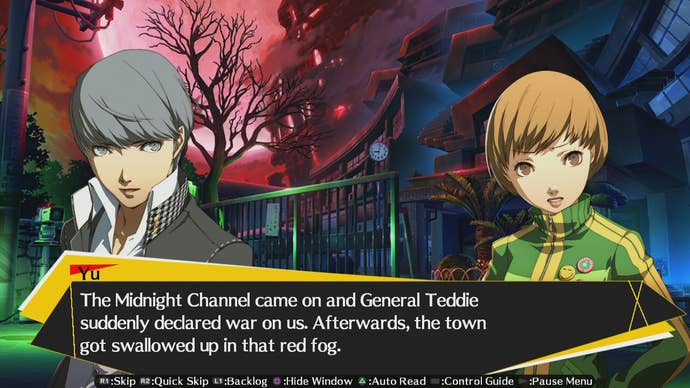
Ultimax continues that plot with the same presentation: visual novel dialog scenes with amazing character art, animated cutscenes, and a story that you peel like an onion. The Persona 4 Investigation Team is enjoying life without The Midnight Channel when their town is engulfed in a red mist. This mist brings with it the tower of Tartarus and all the properties of the Midnight Channel, allowing the team to summon their Personas in the real world. The foe behind the events of the first game is revealed and he's captured the Shadow Operatives (the Persona 3 characters) who helped out in the last mess. It up to Yu Narukami and friends to beat their Shadow shelves and figure out what's going on.
The story is told in two chapters available in the game at launch: Episode P4 and Episode P3. There's also the recap Episode P4A and the all-new Episode Adachi available as downloadable content. While Persona 4 Arena split its story into character-specific lines, Ultimax's story goes in a different direction and hops back and forth between characters. It's still a pretty lengthy part of the game and if you're a story fan, Atlus and Arc System Works offer the ability to let the computer play the fighting game sequences for you. This means you can sit back and watch the tale unfold without worrying about your fighting prowess. It's great if you're deep into Persona lore, but not the best fighting game player. Story Mode is awesome if you're a Persona fan, but there are no branching choices here. It just tells the story and you fight sometimes, meaning it can definitely drag at points.
If you've played Persona 4 Arena, all of your (re-balanced) favorites are here with some brand-new editions. From the previous game, you have Yu Narukami, Yosuke Haramaru, Chie Satonaka, Yukiko Amagi, Kanji Tatsumi, Naoto Shirogane, and Teddy on the Persona 4 side, Aigis, Mitsuru Kirijo, Akihiko Sanada, and Elizabeth from Persona 3, and Labrys from Persona 4 Arena. Atlus and Arc System decided to give the smaller Persona 3 cast some love this time around: the existing cast is joined by Rise Kujikawa (who gets a big promotion during the story) from Persona 4, Junpei Iori, Yukai Takeba, and Ken Amada from Persona 3, and the all-new, mysterious badass Sho Minazuki. Finally, there's the DLC characters: Marie, Margaret, and Tohru Adachi (who's free to download for launch week). Most of these characters also include Shadow versions, which play more offensively and build SP more efficiently than their normal counterparts. It's a cheap way to expand the cast, but it works.
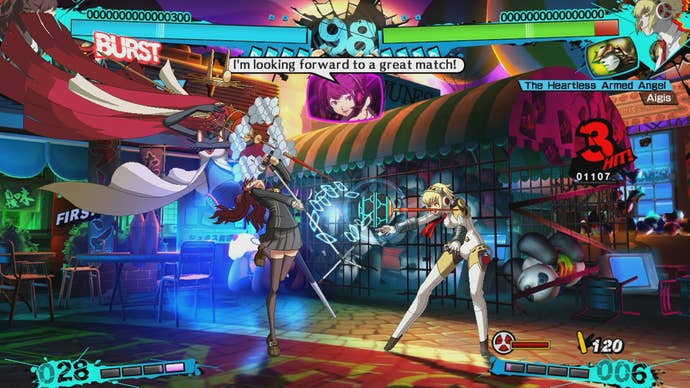
Ultimax takes great care to differentiate each character - like Arc System Works' Guilty Gear and BlazBlue - but the emphasis is on their Persona. The game is played on four buttons: two attack buttons and two Persona buttons. The attack buttons are basic and involve each character attacking with their weapon of choice (Kanji with the metal chair is the best).The Persona attacks add flavor to that, as each Persona operates differently. Yu's Persona is a basic attacker and there to setup his combo game, while Yukari's Persona can be used for defense or pressure on the opponent. The characters play so wildly different that they almost feel like they belong in different games, but Arc System's expertise means they all gel together here. There are still clear tiers - Yu and Yosuke say 'Hi" and Adachi is still a beast - but it's possible to be competitive with your favorite Persona character.
Persona 4 Arena was a technical fighting game. In fact, the game was almost too complex at the highest level and that's down to Arc trying to cram a ton of different inputs into four buttons. Here's an illustration, stolen shamelessly from Bitmob.

Crazy right? Most of that you can safely ignore, but as you get better and better, it starts to become required to play. Trying to remember if you need to use a Reversal Burst, Quick Escape, or an All-Out Attack in the heat of battle and trying to remember what the button combinations for those moves are is a tall order for a neophyte. Yes, the Dual Shock 3 offloads some of those combinations onto the shoulder buttons, but it's a bit much.
Atlus and Arc System Works seem to have noticed the big barrier for new players, because there are a few systems in Ultimax to grease the rails. The new Skill Hold system lets you use special Skills by simply holding down a button, Auto Combos let you jam on the weak attack button to perform cool multi-hit combos, and the P-Combo is a simple chain combo. New players can mix-and-match these systems to hold their own in the early game, but they'll still get stomped out by players who' understand've mastered all the systems in the chart above.
Ultimax also includes a whole host of online and offline modes. For online mode, you get player matches, ranked matches, and the Lobby, where you can roam around, talk with other players, and fight them. In the offline category, you get the Story Mode, Arcade Mode, Score Attack, a Versus Mode for local battles, Lesson Mode to teach players about the game's systems, a standard Training Mode for practice, and Challenge Mode, asking players to complete character-specific moves and combos in increasing difficulty.
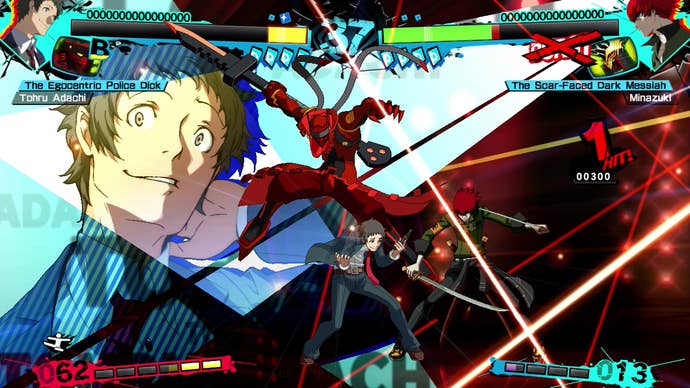
There's also the Golden Arena Mode, which lets you pick a character to battle through a tiered dungeon to gain EXP. This EXP can then be used improve a character's stats and leveling up unlocks various skills to equip. Golden Arena also brings back the Social Link system from Persona 4, letting you pick a partner to tackle the dungeon with you; the longer you play with that partner the more helpful skills you'll unlock for battle. It's rather robust and reminds me of Street Fighter Alpha 3's World Tour mode, which was a highlight in that title. If you have the time and are willing to put forth the effort, Golden Arena Mode can be very rewarding.
Persona 4 Arena Ultimax is still a solid fighting game that attempts to appease hardcore Persona fans and fighting gamers alike. It largely succeeds at that, though both sides never truly meet within the game. The game has a strong visual style, a decent story, and a deep, technical fighting game experience. I wouldn't pick this up if you haven't played Persona 4 at least, but if you have and you enjoy fighting games, this is a treat.
VisualsGreat hand-drawn 2D character art with high-resolution character portraits and 3D backgrounds that look 2D at a glance. Great stuff.
SoundIf 70's-style Japanese pop music and opera are your thing, Ultimax has you covered.
InterfacePersona 4 Arena Ultimax continues the great visual style that Atlus started in Persona 4. Bright colors are backed by a television studio aesthetic that extends from the game's opening to the win portraits in each match.
Lasting AppealOnce you finish the lengthy Story Mode, Challenge Mode and Golden Arena Mode can add more playtime to Ultimax' experience.
ConclusionPersona 4 Arena Ultimax is a great follow-up to Atlus and Arc System Works' first collaboration. The game marries a good story, your favorite Persona characters, and a technical fighter without completely losing its way. It is a bit too complex at times, with dozens of different systems at your fingertips, but the developer has added some training wheels for new players. If you're a big Persona fan or hunting for a new 2D fighter, Ultimax is for you.


